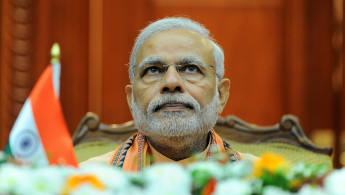Modi's Israel visit marks dramatic break from past relations
Narendra Modi will arrive in Israel on Tuesday in the first visit to the country by an Indian prime minister, marking an historic turning point in burgeoning relations after decades of frozen ties.
Rooted in anti-imperialism, anti-colonialism, and Third Worldism, India has traditionally been a vocal supporter of the Palestinians, initially shunning diplomatic relations with Israel and remaining on good terms with the Arab world.
India voted against the 1947 UN partition plan of British Mandate Palestine and was the first non-Arab country to recognise the authority of the Palestine Liberation Organisation (PLO).
India recognised Israel in 1950, but it would be 42 years later before both countries established full diplomatic relations in 1992, facilitating an exchange of ambassadors.
Since Modi's Hindu nationalist Bharatiya Janata Party stormed to power in 2014, India has undergone a huge military modernisation program worth more than $100 billion - and Israel has been a key player.
India is now Israel's biggest arms market, buying weapons at an average of $1 billion each year.
 |
India is now Israel's biggest arms market, buying weapons at an average of $1 billion each year |  |
In April, state-owned Israel Aerospace Industries said India would buy nearly $2 billion worth of weapons technology, making it the military exporting giant's largest ever defence contract.
The deal will see IAI provide India with an advanced defence system of medium-range surface-to-air missiles, launchers and communications technology.
It later announced a deal worth $630 million to provide India's navy with missile defence systems.
"This visit will deepen cooperation in a wide range of fields - security, agriculture, water, energy - basically in almost every field Israel is involved in," Netanyahu told the Israeli cabinet in public remarks.
Israel, always in search of allies to vote in its favour at UN bodies as well as business partners, has been portraying the visit as historic.
The two countries have also cooperated on issues such as water and agriculture technology.
Historic support for Palestine wanes
Modi will not travel to Ramallah during his visit, the seat of the Palestinian Authority, breaking with customary protocol where leaders maintain a balance in political ties.
"Narendra Modi's visit to Israel will only strengthen its occupation of Palestine," said Asaduddin Owaisi, a member of India's federal parliament from a regional group that promotes Muslim rights, according to Reuters.
President Abbas's diplomatic adviser Majdi ElKhaldi told The Hindu newspaper this week that India's relations must not come at the "expense of ties" with Palestine, but relations have weakened since Modi's election.
Under the far-right nationalist, India's voting pattern at the United Nations, once decidedly pro-Palestinian, has come to favour Israel.
In 2015, India abstained from a vote at the UN Human Rights Council on alleged war crimes during Israel's 2014 war on Gaza, causing shock among some Palestinian Authority officials.
Modi was once banned from the United States over allegations he deliberately allowed anti-Muslim riots in his home state in 2002, which left over 1,000 people dead.
Last week, he visited Washington where he and US President Donald Trump embraced each other as friends, vowing to work more closely on combatting terrorism, the war in Afghanistan and defence cooperation.
With far-right Hindu nationalist politics now dominating India, the scale of cooperation with Israel far outstrips anything remotely similar with Palestine.
Beyond defence and military ties, Modi's far-right Hindu nationalist supporters find common cause in Israel's hostility to surrounding Muslim majority states, as well as widespread anti-Muslim sentiment.


![Minnesota Tim Walz is working to court Muslim voters. [Getty]](/sites/default/files/styles/image_684x385/public/2169747529.jpeg?h=a5f2f23a&itok=b63Wif2V)






